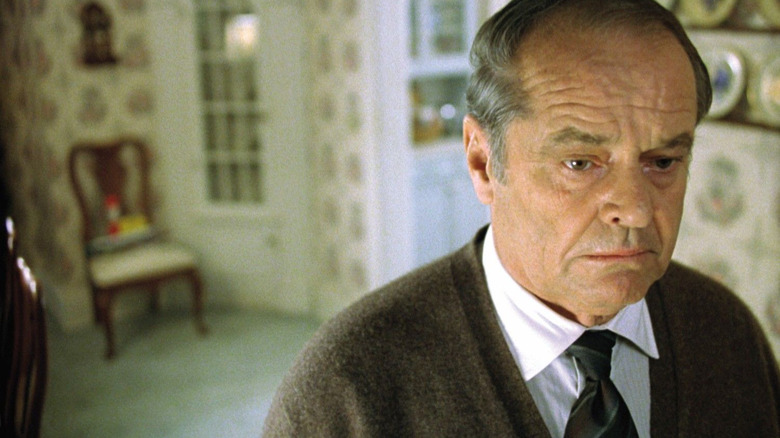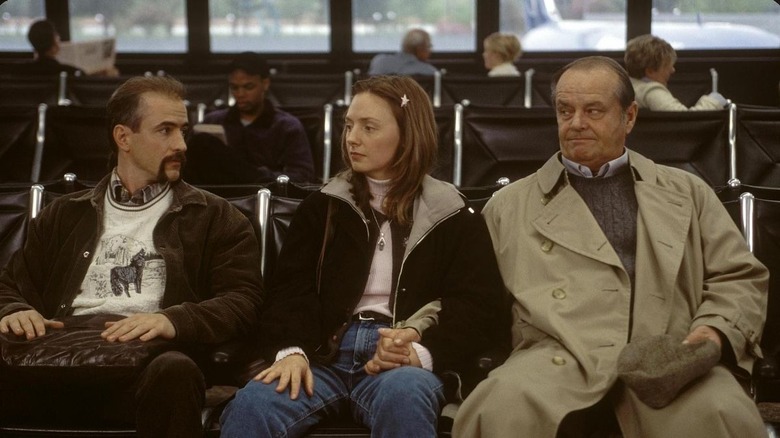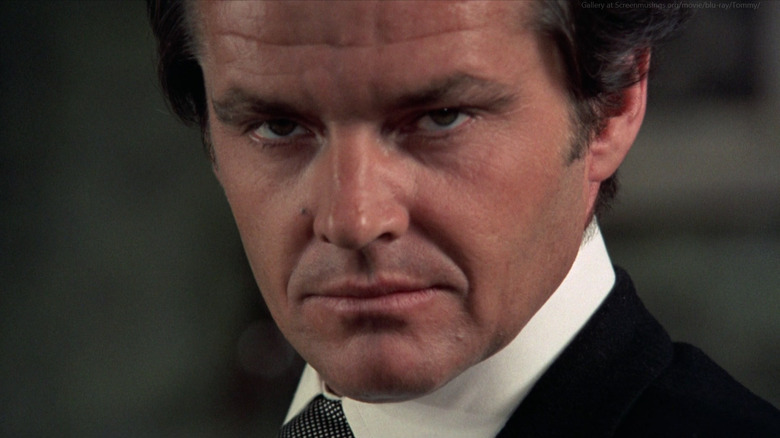Taking On His About Schmidt Role Left Jack Nicholson 'Terrified'
Warren R. Schmidt, the title character played from Alexander Payne's 2002 dramedy "About Schmidt," was a large departure for actor Jack Nicholson. Throughout his career, Nicholson has played a wide variety of incredibly intense, sometimes even broad roles. Even when he played characters who are professional or buttoned down, he carries with him an intellectual intensity, a confidence, a terrifying, underlying rage, that often sees his characters emerging as fierce and heightened.
Schmidt is perhaps the only time Nicholson has played a character defined by how plain he is. Warren Schmidt is a man of routine. He works in a room that is little more than a gray box. His home is a clean, chintzy mausoleum upkept by his pepperpot wife (June Squibb). When Warren retires from his job as an insurance actuary, he is at a loss. When his wife dies, he is not so much saddened as pushed further into emptiness. His only respite, it seems, is a TV ad from Plan USA that implores he send money and letters to an impoverished child in Tanzania. Oh yes, and his daughter (Hope Davis) — from whom he is somewhat alienated — is going to marry and requires his presence. Warren, perhaps for the first time in his life, begins simmering with resentment that might just be spoken aloud before the film's end.
No one was more aware of the career departure "Schmidt" represented more than Nicholson. In a 2008 interview with the Independent, he talked about not just the emotional departure, but the physical bravery "Schmidt" required of him. It was one of the first films where he, then 65, dared to look old.
What if I get stuck?
The interviewer brought up Rob Reiner's 2007 buddy comedy film "The Bucket List" as bringing a new wrinkle to Nicholson's career. In that film, he plays a man who has been diagnosed with cancer who decides to author a list of experiences he would like to have before death. A scene in "The Bucket List" has Nicholson made up to look incredibly sick, his skin pale and craggy. Nicholson pointed out that intentionally looking a mess was something he also had to learn how to do with "Schmidt" some five years earlier. He said:
"I have looked better, I agree. I had that experience, too, on 'About Schmidt.' I really got myself into a mess for that picture as well and every day I would look into that mirror and think, terrified: 'What if I get stuck in this character? What if I can't get back to me?' Then, I guess I have always looked kind of extreme up there."
Schmidt, as an actor might interpret him, is an insidious character. Not in that he wished to do harm to the character around him, but insidious in the way he can creep into a performer's DNA. He doesn't speak a lot, with much of his emotional experience remaining uncomfortably stuffed inside. That Warren Schmidt cannot confess his feelings — except to a boy in Tanzania he's never met — may leave an actor feeling "trapped inside," as it were.
The beautiful Jack Nicholson
Jack Nicholson, while incredibly alluring, was rarely asked to play dazzling, seductive characters. He certainly played multiple attractive characters, but he wasn't ever cast as, say, a square-jawed Indiana Jones type of matinee hero. He did, however, recall one time when a director asked him to play the pretty boy, and it was for a very small role in a very strange film:
"In my whole career there was only one time when a director said to me: 'OK, come right down the pike and just look beautiful, Jack.' That was Ken Russell on 'Tommy.' But film is all about losing your dignity. The last thing you want to do is be self-conscious about it, that would kill it all."
"Tommy" was the 1975 rock opera film based on the album by The Who. In "Tommy," the title character becomes deaf, mute, and blind when he witnesses his mother, played by Ann-Margret, in the arms of Oliver Reed. Nicholson plays a doctor who is called in to assess the boy's sudden condition. It may be one of the only times you'll see Nicholson sing on screen. Leave it to a notoriously kooky director like Ken Russell to tap into the unknown erotic power of Jack Nicholson.
But Nicholson's comment about losing dignity is the more interesting statement. He seemingly has always been willing to forgo movie star composure in service of the role. Perhaps Schmidt was his first time able to finally let it all go. It certainly shows. One cannot make it through the final moment of "About Schmidt" — a close-up of Nicholson — and not be touched.


